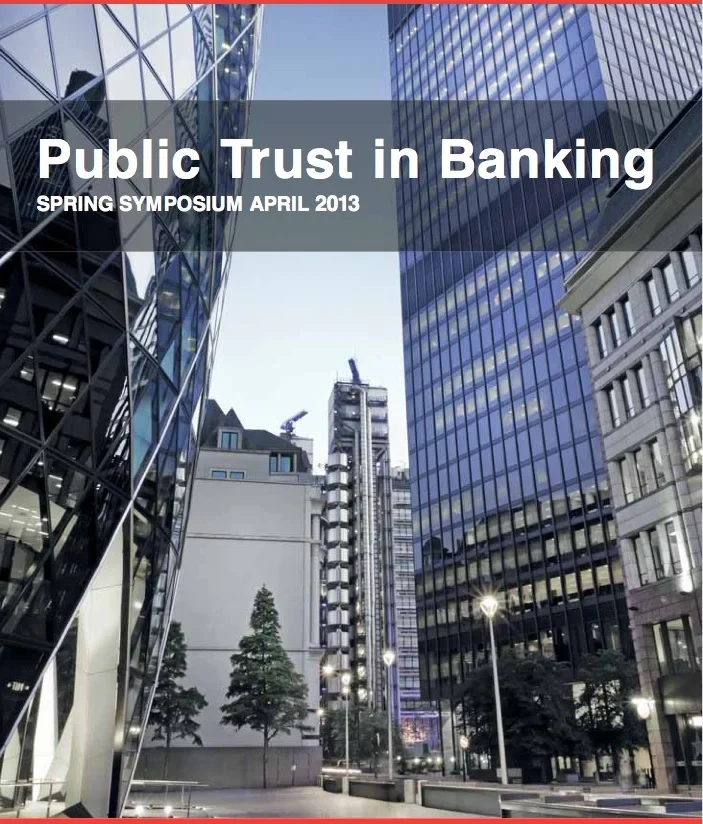How much have the views of British Bankers changed? Quite a lot, discovers YouGov CEO STEPHAN SHAKESPEARE introducing a new YouGov report prepared for the YouGov-Cambridge event 'Public Trust in Banking'
The Masters of the Universe who sat at the top table of British Banking in 2007 have now almost all gone. It was a remarkable clear-out, unexampled in any major industry before. The new guests wear a more sober expression. In our preparation for this study into the reputation of banking (and how to win it back) we talked to them in depth: fifteen Chairs and Chief Executives of our top banks and funds.
How much have the views of the British Banking high command really changed? It turns out, quite a lot. How about this from one of the most senior global players: “Banks lost control of their businesses and had to go cap in hand to ordinary folk to continue to run them. If you add to that the fact that banks are pretty poor on customer service, and in some cases have systematically exploited the relationships they have with customers, it’s pretty clear that the industry needs comprehensive reform and change.”
What surprised me was not that I could locate one or two radicals, but that nearly everyone I talked to had the same clear message: ‘We completely acknowledge what the industry did wrong, we will change ourselves and do whatever it takes to restore trust.’ Some politicians have suggested that while bankers may say this in public, when it comes to negotiating with reformers behind closed doors they remain very focused on the narrower interests of their industry.
But in my conversations, which were held off-the-record, I found that industry leaders were solid in their belief that even where they did not agree with all proposed measures, they were willing to take the hit if that was the cost of winning back public acceptance of their right to operate. Not one of them, not even one of the most individualistic swashbucklers of gung-ho capitalism, believed the industry could continue without root-and-branch reform.
There were however some moments of indignation, a sense that banking had been made to take all the blame when politicians and regulators, media and public behaviour had all contributed to the overdeveloped risk-taking culture. A senior director of one of our most international banks: “In a sense there are huge amounts of blame to go around but many people have been quite effective at deflecting more of that blame on to the banking sector. I’m not saying the banks didn’t deserve a chunk of blaming, but it has been very convenient for the politicians, for example, to blame the banking sector.” The director compared the banks to “overenthusiastic waiters at a party, who were happily drinking themselves and happily giving everybody they could find too much to drink. “You have also got to think who bought the drink and whose party it was. So absolutely they were excessive as the waiters, but it’s not the whole story; there are politicians and there are central bankers who absolutely can understand and absolutely wouldn’t disagree with my depiction at all but that’s not the picture that the general public has had communicated to them.”
Sometimes that frustration and sense of hurt bubbled to the emotional surface.
One senior manager at one point waving a fist, said: “This is the first big financial economic recession of the social media era, so everybody can have a view about any damn thing and then they can express it within five seconds of something happening, and it seems to make no difference whether they have any authority in making an opinion. The reason that’s so relevant is this interesting interplay between our decision makers, especially the politicians, and that social media, which then of course in itself influences public opinion. So, to put it another way, why the hell has Vince Cable still got a job when he’s the Minister for Business and he uses the phrase ‘cesspit’ twice to describe the City. It’s frankly outrageous... The City, despite all its evils, has contributed about 2.5% of UK GDP surplus to the balance of payments for the last thirty years. So how can something which has at the heart of it banking, be regarded by people who are informed as being so useless? It’s pathetic.”
Though few were that angry, several were bemused by what they saw as the illogicality of political opinion; one of the bankers told me, “It’s definitely going too far, the way that politicians have managed to switch virtually entire blame for the entire financial crisis onto the banking system in the UK. So the UK’s going to be left as the only country in the world where you can’t have a universal bank.... Once you got it put into the public mind that the financial crisis was caused by banks, and was caused by casino banks, therefore the next rhetoric is ‘if we can separate the good banks, i.e. retail banks, from the casino element all will be well in the world’ – Ignoring the obvious fact that the banks that failed tended to be retail banks!”
The overall force of every single interview I conducted was an open and frank acknowledgement that the industry had made systematic mistakes, taking huge unjustified risks and over-indulged on the reward side. A leading figure in the industry expressed the general view that banks should be led in a way that is accountable to the public: “Broader society can hold us accountable. The first time I find a trader, who may be the biggest revenue producer we’ve got, who is not driven by the values, they are gone. We are going to run in a way that serves all the big stakeholders, and that is socially useful in its aggregate. In essence, this is not about creating short term profitability, this is about creating sustainability for the long term... If you’re a hedge fund, or a trader, and you’re in and out of the stock, then you want to ride the curve and you’ll take the upside, and try and avoid the downside. I don’t want those people on my share register.”
They added: “Banks are fundamentally different from other commercial enterprises, in that they sit at the heart of the economies where they do business. Without a vibrant banking system, you can’t have a vibrant economy, without a vibrant economy, you cannot have a vibrant society. So, this is not an academic issue, this is an issue that will affect the political economy, in the broader sense of the United Kingdom, for the next 30 years, at least. How do we ensure that we understand the risk within the banking system? How do we make sure that that risk is adequately underwritten, and how do we make sure that the taxpayer doesn’t end up footing the bill for that risk? So, there is one question about risk, and there is a second question about conduct. There needs to be a debate on conduct between the new conduct authority, the industry, and other interested parties, like consumer groups. It is possible to frame that in a public policy context, right?”
The purpose of this YouGov-Cambridge study is to help frame that debate. Our work is divided into a ‘benchmarking’ section where we provide a series of different measures of public opinion about banking, and a ‘deliberative’ section where we explore the public’s view as it changes (or doesn’t change) when different information, arguments and messages are presented. They are intended to provide a continuing framework for understanding how the relationship between society and the banking industry is changing.
Highlighted by one banker we spoke to: “Be very realistic about the fact that we are in repair mode in terms of the industry’s standing in the public mind, for some time to come; that the path to redemption will be one where achievements will probably get underestimated and setbacks will get exaggerated”.









